Mill House (Ballinascarty)
Houses within 10km of this house
Displaying 85 houses.
Houses within 10km of Mill House (Ballinascarty)
Displaying 85 houses.
| House name | Description | |
|---|---|---|
| Warrensbrook | Richard Donovan was leasing this property to Daniel Donovan at the time of Griffith's Valuation, when it was valued at £14. There is still a house at this site, part of a large farm complex. |

|
| Fort Prospect (Clonakilty) | Reverend Benjamin Swete was leasing this property to Richard Wheeler at the time of Griffith's Valuation, when it was valued at £15 15s. In 1837, Lewis notes it as the seat of R. Wheeler. It is still extant. | |
| The Cottage | A house built after the first Ordnance Survey. Thomas Gillman was leasing this property from George Wiseman at the time of Griffith's Valuation, when it was valued at £11 5s, It is still extant and known as Grove House. |

|
| Knockaneady | John Beamish was leasing this property to John Schofield at the time of Griffith's Valuation, when it was valued at £6. It does not appear on the later 25-inch Ordnance Survey map of the 1890s. | |
| Ballymoney Glebe House | At the time of Griffith's Valuation, Reverend Robert Meade was leasing this property from the Trinity College estates when it was valued at £23. A slightly different building is labelled "Rectory" on the 25-inch Ordnance Survey map of the 1890s. It is still extent and in use. |

|
| Phale Court | At the time of Griffith's Valuation, Standish Smithwick was leasing this property from William Stanley, when it was valued at almost £8. It is recorded as Phale House on the 1st edition OS Map and as Phale Court on the later 25 inch Map. In 1837, Lewis refers to Phale House as the seat of E.H. Good. In 1914 it was occupied by the Hosford family. In 1786 Wilson refers to it as the seat of John Wade. It is also associated with the Deasy family. |

|
| Mount Beamish | John Beamish was leasing this property to Rev. John Baldwin at the time of Griffith's Valuation, when it was valued at £15. In 1837 Lewis records it as the seat of J. Beamish. Leet noted it as the seat of Rev. Samuel Beamish in 1814. Farm buildings exist at the site now. | |
| Drombofinny House | Benjamin Daunt was leasing this property from the Devonshire estate at the time of Griffith's Valuation, when it was valued at almost £8. It is labelled Drombofinny House on the 25-inch Ordnance Survey map of the 1890s. A house still exists at the site. | |
| Kilmoylerane House | Richard J. Long was leasing this property from the Devonshire estate at the time of Griffith's Valuation, when it was valued at £15. A house and extensive farm buildings exist at the site. | |
| Roseville | At the time of Griffith's Valuation, Henry Beamish was leasing this property to Bernard Beamish, when it was valued at £16. Henry Beamish was also the owner of a flour mill [W381539] in the same townland, leased to William Norwood, and valued at £150. The mills do not appear on the 25-inch Ordnance Survey map of the 1890s. Roseville is still extant. | |
| Kilrush House | Thomas Beamish held this property in fee at the time of Griffith's Valuation, when it was valued at £24. Lewis records it as the seat of A. Poole in 1837. The National Inventory of Architectural Heritage records that an earlier house, built around 1650, originally stood at this site and the extant house may incorporate parts of that earlier structure. |

|
| Lisbehagh | Sampson Beamish was leasing this property to John Donovan at the time of Griffith's Valuation, when it was valued at £8. | |
| Church Hill House | At the time of Griffith's Valuation, Rev. Mountifort Longfield was leasing this property from Susan McDonnell, when it was valued at £24. [This may be Susan McDaniel of Bandon, as Daniel McDaniel of Knockmacool, is listed in a Bandon Directory of 1876]. Lewis records the house as the seat of Mountifort Longfield in 1837. It is still extant. |

|
| Knockmacool House | Mrs Susan McDonnell [McDaniel] held this property in fee at the time of Griffith's Valuation, when it was valued at £11 10s. It is labelled Desert Cottage on the 1st edition Ordnance Survey map and Knockmacool House on the later 25-inch edition. An Encumbered Estates Sale notice of May 1851 indicates she had previously held it from the Warren estate. A house is still extant at the site. | |
| Kill House | Richard J. Long was leasing Kill House from the Attley [?] estate at the time of Griffith's Valuation, when it was valued at £8. There is still a house at the site. | |
| Inchydoney House | At the time of Griffith's Valuation, Thomas Hungerford was leasing this property from the Ecclesiastical Commissioners when it was valued at £22. Described by Lewis as "Island House" and the seat of T. Hungerford in 1837. In 1906 it was owned by Mary Sandes Hungerforde and valued at £31 15s. The house is now used as a religious retreat centre. |

|
| Youghals House | A Miss Walsh was leasing this property from the Earl of Shannon's estate at the time of Griffith's Valuation, when it was valued at £14. This house is still extant. |

|
| The Retreat (Island) | Richard Beamish was leasing this property from Winspur Toye at the time of Griffith's Valuation, when it was valued at £20. A house is still extant at the site. | |
| Kilgarriff House | Henry Bence-Jones, a distinguished physican and scientist, was leasing this property from Rev. Henry Stewart, at the time of Griffith's Valuation, when it was valued at £24 10s. In 1837, Lewis refers to it as the seat of Capt. Davis. A house still exists at the site. | |
| Bushmount | Not visible on the 1st edition Ordnance Survey map but named as Bushmount on the 25-inch edition of the 1890s. Johanna Deasy was leasing this property from the Earl of Shannon's estate at the time of Griffith's Valuation, when it was valued at £22 10s. The Deasy family were brewers in the town of Clonakilty. [Now the site of St. Paul's Nursing Home.] | |
| Fern Hill | AT the time of Griffith's Valuation, this property was being leased from the Earl of Shannon's estate by Anna Atkins. It was then valued at £28. In 1837, Lewis refers to it as the seat of W.F. Atlkin. Now part of the Fernhill House hotel complex. |

|
| Lower Tawnies Cottage | Rev. Henry Stewart was leasing this property from the Earl of Shannon's estate at the time of Griffith's Valuation, when it was valued at £13 15s. Lewis notes it as the seat of the Rev. Dr. Stewart in 1837. It is still extant but unoccupied. |

|
| Millville | Thomas and James Allen were leasing this property from the Earl of Shannon's estate at the time of Griffith's Valuation, when it was valued at £15 and the adjacent mills at £37. The house is still extant. Modern housing now occupies the site of the mill. | |
| Scartagh Cottage | Tradition locally suggests Scartagh Cottage was originally the property of the Townsend family. By the time of Griffith's Valuation, it was being leased by Henry Galway to Matthew O'Hea. Various members of the Galway family held small amounts of land in the area while Matthew O'Hea, of the War Office, London, is recorded as the owner of 70 acres in county Cork in the 1870s. Scartagh Cottage has been replaced by a convent on the 25-inch Ordnance Map towards the end of the nineteenth century and that building is still extant. | |
| Ahalisky | William Bence-Jones held this property in fee at the time of Griffith's Valuation when it was valued at £14. A plant nursery is identified at this location on the 1st edition Ordnance Survey map. Extensive farm buildings occupy the site now. | |
| Kilmaloda House | Thomas Beamish held this property in fee at the time of Griffith's Valuation, when it was valued at £50. In 1837, Lewis refers to it as the seat of Sampson Beamish. In 1906 it was owned by Sampson Beamish and valued at £68 15s. Local sources suggest it was built by the earlier Sampson Beamish and occupied by his descendents until the mid twentieth century when it came into the hands of the McCarthy-Murrough family. It is still extant and occupied. In 2013 it was offered for sale. |

|
| Beaumont | William Wright was leasing this property from Rev. Thomas Beamish at the time of Griffith's Valuation, when it was valued at £10 10s. Built after the 1st edition Ordnance Survey map opposite the site of a diocesan school. In 1814, however, Leet noted Beaumount as the seat of William Beamish. Mrs. Susan Beamish, of Beaumont, Clonakilty, was the owner of over 1300 acres in county Cork in the 1870s. This house is no longer extant. | |
| Skeaf House | Herbert Gillman was leasing this property from William Austin at the time of Griffith's Valuation, when it was valued at £20 15s. Lewis recorded it as the seat of W. Austin in 1837. Together with other Austen property it was offered for sale in the Encumbered Estates Court in June 1851. In the 1870s it was the residence of John E. O'Sullivan though it was offered for sale by him in the Landed Estates Court in April 1880 when it was described as "a fine residence". A house still exists at the site. |

|
| Kilnagross | At the time of Griffith's Valuation, William Sullivan was leasing this property to Rev. Somerset Townsend, when it was valued at almost £12. In 1837, it was the seat of Rev. W. Sullivan. It is no longer extant. | |
| Shannonvale House & Mill | At the time of Griffith's Valuation, the Misses Newman were leasing this property to T. & J. Allen, The house was valued at £25 and the mill at £225. Lewis records it as the seat of T. Allin in 1837. The mills afterwards became the property of the Bennett family and later of the Rank company and continued in business until 1963. The house is still extant. In 1786 Wilson refers to a house in this area as "Mount-Shannon, the seat of Dr. Calnan". |

|
| Ardnacrow House | Though buildings existed at this site in the 1830s Ardnacrow House is only labelled on the later 25-inch Ordnance Survey map of the 1890s. At the time of Griffith's Valuation, Winthrop Sealy held this property in fee when it was valued at £29. The original house is now ruined and a modern house has been constructed nearby. | |
| Maryborough | Miss Jane Clerke was leasing this property from Thomas Beggs [Biggs] at the time of Griffith's Valuation, when it was valued at £14. It is likely that this is the same as Thomas Biggs of Dunmanway. In 1837, Lewis had noted the house as the seat of Maj. Broderick. The house appears to have been replaced by a modern building but the remains of the large walled garden are still extant, enclosing large modern farm sheds. | |
| Castle View Mill House | At the time of Griffith's Valuation, Francis Bennett was leasing this property to James Hayes. It was valued at £13 10s and the ajacent mill had a valuation of £56. In 1837, Lewis noted it as the seat of J. Hayes. The mill buildings are still extant at this site. |
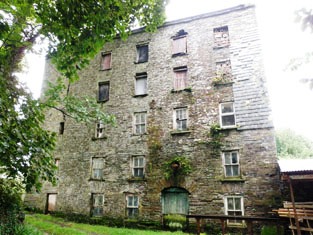
|
| Coolwood House | John Kingston was leasing this property from the Earl of Shannon's estate at the time of Griffith's Valuation, when it was valued at £8. It is not labelled on the 1st edition Ordnance Survey map but appears on the later 25-inch map as Coolwood House. It is still extant and occupied. | |
| Mahon Abbey House | James Harton was leasing this property from "the ladies Boyle" at the time of Griffith's Valuation, when it was valued at £12 5s. It is still extant and occupied. |

|
| Spital Mill House | William Harris was leasing Spital Mill and its house to Charles Connell at the time of Griffith's Valuation, when the whole complex was valued at over £50. The mill buildings are labelled "in ruins" on the 25-inch map, published in the 1890s. A modern industrial complex is now located close to the site. | |
| Muckruss House | Henry B. Beamish was occupying Muckruss House at the time of Griffith's Valuation when it seems to have been jointly owned by him and Thomas Hungerford. It was valued at £14 10s at the time. In 1906 it was owned by William Beamish and valued at £12 10s. It is still extant. A later house, known as Dunmore House (W397379), appears on the 1890s 25-inch Ordnance Survey Map. There is a hotel and golf course in this area now. | |
| Ballyduvane House | Ballyduvane House was held in fee by Mrs. Eliza Beecher at the time of Griffith's Valuation, when it was valued at £25 10s. Lewis refers to it as the seat of M. Becher in 1837. There is still an extant house at the site. | |
| Ballyduvane | Edward Herrick was leasing this property from Mrs. Eliza Beecher at the time of Griffith's Valuation, when it was valued at £12 5s. Lewis refers to it as the seat of E, Herrick in 1837. In 1814 Leet noted it as the residence of Thomas Herrick. Referred to by Slater as the seat of M.A.R. Beecher in 1894. There is still a house at the site. | |
| Springmount or Carhoo House | At the time of Griffith's Valuation, William Beamish was leasing this property from the Earl of Bandon's estate, when it was valued at £11 10s. On the 25-inch map, published in the 1890s, it is labelled Carhoo House. A house and farm buildings are still extant at the site. | |
| Ballyvackey House | Ballyvackey House was held in fee by Mrs. Ellen Alleyn at the time of Griffith's Valuation, when it was valued at £11. In the late 1770s and 1780s it was occupied by the Allen family. It is not shown on the 25-inch Ordnance Survey map of the 1890 and is no longer extant. | |
| Sunmount | George Beamish was leasing Sunmount to Rev. W. John Day at the time of Griffith's Valuation, when it was valued at £20 5s. Lewis refers to Ballyvackey as the seat of G. Beamish in 1837. In 1906 it was owned by William Hungerford and valued at £23. It is no longer extant. | |
| Ballynamona House | John M. Travers was leasing this property together with over 135 acres to Thomas Beech in or at the time of Griffith's Valuation. A house is still extant at the site. | |
| Ring Arundal | Jasper Lucas was leasing a house and extensive mill complex from the Smith-Barry estate at the time of Griffith's Valuation, when its combined value was £23. The mill is not present on the 25-inch Ordnance Survey map of the 1890s. The house is still extant. |

|
| Lackenduff House | Thomas Lucas was the owner of this property, unoccupied at the time of Griffith's Valuation, when it was valued at £15 10s. Lewis refers to Lackenduff House as the seat of J. Lucas in 1837. It is still extant and occupied. |

|
| Ring House | Ring House was being leased by Henry Austin to Henry B. Beamish at the time of Griffith's Valuation, when it was valued at £8 10s. There is still a house at the site. |

|
| Richfordstown House | Thomas Lucas was leasing this property from the Smith-Barry estate at the time of Griffith's Valuation, when it was valued at £26. It was the seat of Jasper Evans Lucas in 1814. In the 1870s John R. Lucas was the owner of the property. There is now a large farming enterprise here, as well as a house which may have replaced the earlier house. |

|
| Concamore House | James Nelson Crofts was leasing this property from Lady Carbery's estate at the time of Griffith's Valuation, when it was valued at almost £10. He was the fifth son of William Crofts of Velvetstown and was married to Dora, daughter of Jasper Lucas, of Richfordstown, Clonakilty. There is still an extant house at the site. | |
| Barryshall | Barryshall was held in fee by the Smith-Barry estate at the time of Griffith's Valuation, when it was valued at £15. In 1837, Lewis referred to it as the seat of J.Lucas. In 1894 Slater refers to it as the seat of George Lamb. In 1942 the Irish Tourist Association Survey stated that the house had been erected by the Barry family in the mid eighteenth century. Barryshall is still extant. |
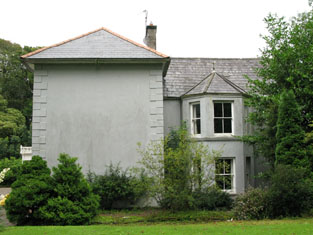
|
| Timoleague House | In 1837 Lewis refers to Timoleague House as the seat of G. Travers. At the time of Griffith's Valuation, it was held in fee by Robert Travers and valued at £21. This house was burnt in December 1920 along with the ancient castle nearby. The Travers family built another house close by which is still extant and occupied. |

|
| Ummera | Robert Travers was leasing this property to Samuel McCaul at the time of Griffith's Valuation, when it was valued at £14. Lewis refers to it as the seat of Rev. B. Swete in 1837. In 1814 Leet notes Ummery as the seat of Rev. A. Sealy. Ummera House is still extant. |

|
| Lettercollum House | Lettercollum House was built by members of the Beamish family in the 1860s and occupied by them until the twentieth century. It served as a convent for the Sisters of Mercy and was later run as a guesthouse. It is now the focus of the Lettercollum Kitchen Project. |

|
| Palace Anne | Wilson, writing in 1786, refers to Palace Anne as the seat of Mr. Bernard. Both Leet in 1814 and Lewis in 1837 note Palace Anne as the residence of Arthur B. Bernard. It was held in fee by him in 1851 when it was valued at £30. Lewis describes it as " a stately mansion, beautifully situated". Bence Jones states that it was named in honour of Anne LePoer, wife of Arthur Bernard, who built the house in 1714. The house became dilapidated after the sale in the mid-nineteenth century and much of it has been demolished though one wing still survives. In 1944 the Irish Tourist Association Survey reported that it was then in a possession of Mr Warner who had refurbished this wing as a dwelling. The Survey provides a detailed description of the remainder of the property. |

|
| Roundhill | The house and demesne at Roundhill were offered for sale in the Encumbered Estates Court in 1855. The sale notice indicates that the property was being leased by the Bowens to the Earl of Bandon's estate. Leet refers to Roundhill as the residence of Rev. Kenny in 1814. The building is now in use as part of Bandon Grammer School. |
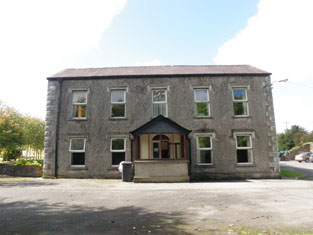
|
| Curravarahane House/Bernard Court | William Smith Bernard was leasing this property from the Bandon estate at the time of Griffith's Valuation, when it was valued at £42. Lewis notes the residence of W.S. Bernard, as The Farm, in 1837. It was labelled Bernard Court on the 25-inch Ordnance Survey map of the 1890s. It is still extant. |

|
| Gurteen Old Mill | Samuel Levis was leasing this property, including a mill, valued at £10, to John Crowley, at the time of Griffith's Valuation. Earlier, in 1786, Wilson refers to a property at Gurteen owned by Mr. Gilman. It is labelled Gurteen Old Mill on the first edition Ordnance Survey Map. It does not appear on the 25-inch Map of the 1890s and there is no trace of it now. | |
| Mayfield | In the 1770s and 1780s, Poole Esq was resident at Knocknaville near Bandon. Thomas Poole held Mayfield in perpetuity at the time of Griffith's Valuation, when it was valued at £48. Both Lewis, in 1837, and Leet, in 1814, also refer to it as his residence. Mayfield was burnt in June 1921 during the War of Independence when it was the residence of Hewitt R. Poole. It is now a ruin. |

|
| Hare Hill | At the time of Griffith's Valuation, Hare Hill was being leased by Thomas Beamish from the Poole estate, when it was valued at £20. Lewis notes it as the seat of J. Beamish in 1837. The National Inventory of Architectural Heritage notes that it was partially damaged by fire in the early 1920s but subsequently restored. |

|
| Sun Lodge/Hoe Lodge | Sun Lodge was being leased by James Hallinane from the Poole estate in the 1850s when it was valued at £13 10s. Lewis refers to it as the seat of W. McCarty in 1837. It is labelled Hoe Lodge on the 25-inch Ordnance Survey map of the 1890s, the name by which it is still known. |

|
| Mount Prospect (Bandon) | William Lane was leasing this property from the Allman estate at the time of Griffith's Valuation, when it was valued at £37. Lewis refers to Mount Prospect as the residence of Mrs. Bradshaw in 1837. A house still exists at this site. |

|
| Milton House (Bandon) | Elizabeth Swete was leasing Milltown from Miss McCarthy at the time of Griffith's Valuation, when it was valued at £22. It is labelled Miltown House on the 1st edition Ordnance Survey map but as Milton House on the 25-inch ediiton of the 1890s, the name by which it is still known. The National Inventory of Architectural Heritage suggests it was built for the Allman family. |

|
| Overton | Overton House was held by Miss McCarthy at the time of Griffith's Valuation, when it was valued at £32. Lewis notes it as the residence of Col. Clerke in 1837. it is a house principally associated with the Allman family. The adjacent cotton mill is described as "disused" on the 25-inch Ordnance Survey map of the 1890s. Both buildings are now in ruins. |
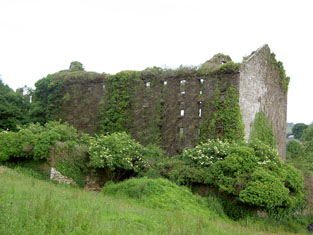
|
| Cashelmore House | In 1851 Thomas Beamish was leasing this property from Richard Longfield O'Connor when it was valued at £18. Lewis refers to it as the seat of J. Beamish in 1837. It was the residence of John Beamish in 1814. Buildings are still extant at the site. | |
| Kilcolman House | Held in fee by William Galway in 1851 when it had a valuation of £38. In 1837 Lewis identified it as the residence of Adderley Beamish, "beautifully situated on the banks of the river Bandon and surrounded by fine plantations". Capt. Beamish had fought in the Napoleonic campaigns at Talavera and Waterloo. He also had a house at Knaresborough in Yorkshire. Kilcolman was burnt in June 1921 during the War of Independence when it was the residence of the Longfield family. It is now a ruin. | |
| Kilhessan Lodge | James Jellett was leasing this house from the Poole estate in 1851 when it had a valuation of £13. A house is still extant at the site. | |
| Mount Bernard | William Bernard was leasing this property from the Devonshire estate at the time of Griffith's Valuation, when it was valued at £15 10s. A house is still extant at this site. |

|
| Carhoon House | Thomas Bullen was leasing Carhoon from the Devonshire estate in 1851 when it was valued at £10 10s. It is still extant and part of a large farming enterprise but not occupied. |

|
| Laragh House | In 1851 Edmund Murphy was leasing this property, then valued at £28, from the Devonshire estate. There was a mill adjacent. Lewis records it as the residence of I. Swanton in 1837. It is still extant and part of a large farming enterprise. |

|
| Shinagh House | Leased by Thomas Banfield from the Devonshire estate in 1851 when it was valued at £18. Local sources suggest that the Banfields had resided there since at least the 1690s. This building is labelled Shinagh House on the 1st edition Ordnance Survey map but has disappeared by the 1890s when Shinagh House is shown some distance north-east of the original site at W457555. A business centre now occupies the site. | |
| Mawbeg House | Leased by Robert Popham from the Devonshire estate at the time of Griffith's Valuation, when it was valued at £10. A house still exists at the site. |

|
| Mawmore House | William Scott was leasing Mawmore from the Devonshire estate in 1851 when it had a valuation of £24. Lewis refers to is as the seat of S.B. Beamish in 1837. A house still exists at the site. |

|
| Enniskean Cottage or Mount Lodge | Noted by Lewis as the residence of Rev. W. Sherrard in 1837 and being leased by him from James Gillman in 1851 when it was valued at £12 10s. Later the residence of Orpen Beamish, MD. It is labelled Enniskean Cottage on the 1st edition Ordnance Survey map but as Mount Lodge on the 25-inch map of the 1890s. It is still extant. It was offered for sale in 2023. |
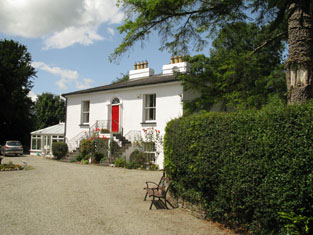
|
| Mary Ville (Kinneigh) | Leased by Joseph Hosford from the Devonshire estate at the time of Griffith's Valuation, when it was valued at £11 10s. | |
| Gardeville | Noted by Lewis in 1837 as the seat of Rev. W. Hall. Leased by Sarah Hosford from the Devonshire estate in 1851 when it was valued at £13. | |
| Lakemount (Kinneigh) | John J. Baylis, MD, was leasing Lakemount from the Devonshire estate in 1851, when it was valued at £14. It is still extant and well-maintained. |

|
| Dromavane House | Leased by Thomas Wrenn from the Devonshire estate at the time of Griffith's Valuation, when it was valued at £9. It it still extant and occupied. |

|
| Palace Anne Mills | A substantial milling complex and house, leased to William Norwood by Arthur B. Bernard in 1851, when it was valued at £34. Lewis referred to the property as "an extensive flour mills" in1837. The property has been converted into apartments in the last decade. |

|
| Kilmeen Glebe (East Carbery) | Reverend Edward Alcock was leasing this property from the Ecclesiastical Commissioners in 1851 when it was valued at £23. Lewis notes that there were large plantations around the house in 1837, when it was the seat of Reverend E.H.Kenney. In 1944 the Irish Tourist Association Survey reported that it was then the residence of Rev. Gorman. Buildings are still extant at the site. | |
| Bennetts Grove | Leased by Francis Bennett to William Beazley at the time of Griffith's Valuation, when it was valued at £13 10s. Lewis refers to it as the seat of Herbert Gillman in 1837. In 1814 it was the seat of Francis Bennett. The original house seems to have been replaced by farm buildings. | |
| Caherconway House | Leased by Nicholas Cummins to Daniel Bechinor [or Buchinor] at the time of Griffith's Valuation, when it was valued at almost £8. | |
| Coolnaconarty House | Held in fee by Herbert Gillman at the time of Griffith's Valuation, when it was valued at £6. Not labelled on the 1st edition Ordnance Survey map but named Coolnaconarty House on the 25-inch map of the 1890s. It is no longer extant. | |
| Lisselane | Bence-Jones indicates that this house was built by Wiliam Bence-Jones in 1851-53. A small property, owned by the family, had existed there prior to the building of the current house. The house was sold by the Bence-Jones family in 1930. The spectacular gardens are now open to the public. In 2014 the lisselan estate was offered for sale. See www.lisselan.com. |

|
| Sunville (Kilbrittain) | James F. Sweeney was leasing this property from William B. Bernard's estate at the time of Griffith's Valuation, when it was valued at £10. It included Knockavortelig Mill which does not appear on the 25-inch map of the 1890s. A house still exists at the site. | |
| Knockbrown | A property built after the 1st Ordnance Survey was published. It was held in fee by Thomas B. O'Callaghan in 1851 when it was valued at £8. There is still an extant house at the site. | |
| Rossmore (Kilmeen) | At the time of Griffith's Valuation, Jeremiah Collins was leasing Rossmore from the superioress of the Presentation Convent in Cork. The house was valued at £13 at the time. In 1944 the Irish Tourist Association Survey referred to Rossmore as a "substantial farm dwelling", a description which is still valid. |

